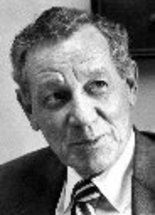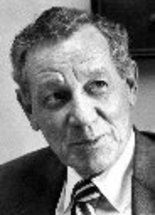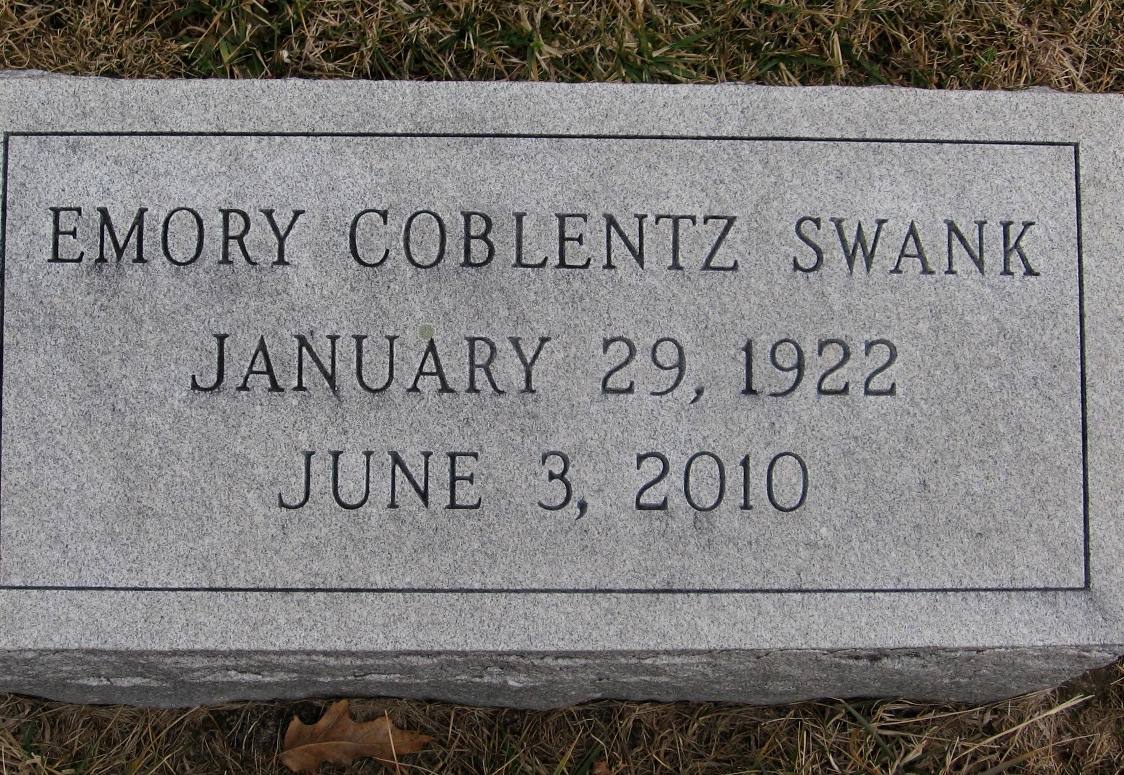Emory C. Swank: peace-minded ambassador,
head of Cleveland Council on World Affairs
Oberlin -- Emory Coblentz Swank lost a rising career in the State Department by opposing U.S. attacks and other policies in Cambodia.
Swank thrived in Cleveland, though, leading the resurgent Cleveland Council on World Affairs from 1977 to 1987.
He died June 3 at Kendal of Oberlin at age 88. He outlived Wat Cluverius, a later council president, by four months, and Patricia Doyle, chairwoman and interim president, by five months.
Swank became the U.S. ambassador to Cambodia in 1970 at age 48 and was widely expected to lead our Soviet Union embassy next.
He survived an attempted assassination in Cambodia, but clashed with higher-ups and was dumped to a dead-end stateside job in 1973. He quit in 1975 and became president and chief executive of the Cleveland Council two years later.
"Coby, backed by a determined group of citizens, turned CCWA around," his successor, Henry Precht, recalled Tuesday. "He formed and motivated a dedicated and efficient staff, rationalized finances, gave impetus to fund-raising and attracted an array of outstanding speakers on international issues who drew new members."
Swank was 5-foot-10, 170 pounds, soft-spoken, and formal in dress. For years, he did 50 pushups per day. The New York Times quoted anonymous colleagues in 1970 fondly calling him "a house mother," who pushed himself hard at the office six days a week but was relaxed and easy-going with others.
Swank was born in Frederick, Md. He won a bronze star as an Army staff sergeant for keeping his unit's radio communications alive during the final scrambling months in Germany. He earned degrees at Franklin and Marshall College and at Harvard University. He also studied at the National War College in Washington, D.C.
Joining State in 1946, he worked in the Soviet Union, Indonesia, China, Romania and D.C., where he was a high aide to the department's leader, Dean Rusk. In 1949, he married a China colleague, Margaret Katherine (Meg) Whiting.
He became deputy chief of mission in Laos in 1964 and in Moscow in 1967. He rose to deputy secretary of state and negotiated with Soviet Leaders over the Middle East. In "A Tangled Web," historian William P. Bundy called him "a sensitive reporter with good policy judgement."
In Cambodia, Swank gradually boosted the staff from about 60 to 200. But his tour "was my most frustrating experience in foreign service," he told The Plain Dealer in 1983. "It should have been the climax of my career." Instead, "I grew increasingly skeptical about what we were accomplishing."
Early on, someone rolled a bomb-laden bicycle toward Swank's limousine. The bomb failed to explode, and the ambassador did not learn about it until a few hours later.
He was no rebel. According to William Shawcross's "Sideshow," Swank tolerated Cambodia's corrupt military and relayed U.S. orders to Cambodian leader Lon Nol to seek air protection from South Vietnam.
But Swank wanted Washington to help the Cambodians, not just use them against North Vietnam. He warned that civil war was rising and Nol's physical and emotional health declining. Like today's critics of America in the Middle East, he feared that our troops and bombs would mostly fan the flames.
In "Years of Upheaval," national security leader Henry Kissinger complained about Swank's peaceful ways. "He observed the restrictions imposed by the Congress with conviction and efficiency--without the sense of frustration that seized me."
So, according to Shawcross and Bundy, the White House directed attacks through Swank's deputy, violating rules against diplomats waging war.
At a farewell press conference, Swank said the war "is losing more and more of its point and has less and less meaning for any of the parties concerned."
He spent two years advising NATO from Norwalk, Va., then retired.
In Cleveland, he turned around a council losing members and money. He won Cleveland Foundation grants, led a Model United Nations, ran outreach programs to high schools, helped start the Akron Council on World Affairs and drew more than 2,000 participants per year.
"As I look back, I have no regrets," he said in 1983. "This is a challenging career here."
He lived in Bratenahl, Beachwood and Kendal of Oberlin. In retirement, the widower lectured on cruises, wrote a book of poems, led a current affairs group at Kendal, and read widely in English, Russian and French.
Emory Coblentz Swank
1922-2010
Survivors: First cousins, Dr. Nat Winston of Nashville, Tenn., Amy Holt of Florence, Ala., Margot Meyer of Gladstone, N.J., Rev. David C. Fox of Cody, Wyoming, Susan Sanitate of Pleasant Ridge, Mich., and Nancy Fox of Golden, Colo.
Memorial service: Being planned at Kendal at Oberlin sometime this fall.
Arrangements: Dicken Funeral Home.
Published in The Clevland Plain Dealer, (OH), Tuesday, June 8, 2010
Thanks to Contributor: Denny Shirer (47137016) •
-----------------------
Emory C. Swank: peace-minded ambassador,
head of Cleveland Council on World Affairs
Oberlin -- Emory Coblentz Swank lost a rising career in the State Department by opposing U.S. attacks and other policies in Cambodia.
Swank thrived in Cleveland, though, leading the resurgent Cleveland Council on World Affairs from 1977 to 1987.
He died June 3 at Kendal of Oberlin at age 88. He outlived Wat Cluverius, a later council president, by four months, and Patricia Doyle, chairwoman and interim president, by five months.
Swank became the U.S. ambassador to Cambodia in 1970 at age 48 and was widely expected to lead our Soviet Union embassy next.
He survived an attempted assassination in Cambodia, but clashed with higher-ups and was dumped to a dead-end stateside job in 1973. He quit in 1975 and became president and chief executive of the Cleveland Council two years later.
"Coby, backed by a determined group of citizens, turned CCWA around," his successor, Henry Precht, recalled Tuesday. "He formed and motivated a dedicated and efficient staff, rationalized finances, gave impetus to fund-raising and attracted an array of outstanding speakers on international issues who drew new members."
Swank was 5-foot-10, 170 pounds, soft-spoken, and formal in dress. For years, he did 50 pushups per day. The New York Times quoted anonymous colleagues in 1970 fondly calling him "a house mother," who pushed himself hard at the office six days a week but was relaxed and easy-going with others.
Swank was born in Frederick, Md. He won a bronze star as an Army staff sergeant for keeping his unit's radio communications alive during the final scrambling months in Germany. He earned degrees at Franklin and Marshall College and at Harvard University. He also studied at the National War College in Washington, D.C.
Joining State in 1946, he worked in the Soviet Union, Indonesia, China, Romania and D.C., where he was a high aide to the department's leader, Dean Rusk. In 1949, he married a China colleague, Margaret Katherine (Meg) Whiting.
He became deputy chief of mission in Laos in 1964 and in Moscow in 1967. He rose to deputy secretary of state and negotiated with Soviet Leaders over the Middle East. In "A Tangled Web," historian William P. Bundy called him "a sensitive reporter with good policy judgement."
In Cambodia, Swank gradually boosted the staff from about 60 to 200. But his tour "was my most frustrating experience in foreign service," he told The Plain Dealer in 1983. "It should have been the climax of my career." Instead, "I grew increasingly skeptical about what we were accomplishing."
Early on, someone rolled a bomb-laden bicycle toward Swank's limousine. The bomb failed to explode, and the ambassador did not learn about it until a few hours later.
He was no rebel. According to William Shawcross's "Sideshow," Swank tolerated Cambodia's corrupt military and relayed U.S. orders to Cambodian leader Lon Nol to seek air protection from South Vietnam.
But Swank wanted Washington to help the Cambodians, not just use them against North Vietnam. He warned that civil war was rising and Nol's physical and emotional health declining. Like today's critics of America in the Middle East, he feared that our troops and bombs would mostly fan the flames.
In "Years of Upheaval," national security leader Henry Kissinger complained about Swank's peaceful ways. "He observed the restrictions imposed by the Congress with conviction and efficiency--without the sense of frustration that seized me."
So, according to Shawcross and Bundy, the White House directed attacks through Swank's deputy, violating rules against diplomats waging war.
At a farewell press conference, Swank said the war "is losing more and more of its point and has less and less meaning for any of the parties concerned."
He spent two years advising NATO from Norwalk, Va., then retired.
In Cleveland, he turned around a council losing members and money. He won Cleveland Foundation grants, led a Model United Nations, ran outreach programs to high schools, helped start the Akron Council on World Affairs and drew more than 2,000 participants per year.
"As I look back, I have no regrets," he said in 1983. "This is a challenging career here."
He lived in Bratenahl, Beachwood and Kendal of Oberlin. In retirement, the widower lectured on cruises, wrote a book of poems, led a current affairs group at Kendal, and read widely in English, Russian and French.
Emory Coblentz Swank
1922-2010
Survivors: First cousins, Dr. Nat Winston of Nashville, Tenn., Amy Holt of Florence, Ala., Margot Meyer of Gladstone, N.J., Rev. David C. Fox of Cody, Wyoming, Susan Sanitate of Pleasant Ridge, Mich., and Nancy Fox of Golden, Colo.
Memorial service: Being planned at Kendal at Oberlin sometime this fall.
Arrangements: Dicken Funeral Home.
Published in The Clevland Plain Dealer, (OH), Tuesday, June 8, 2010
Thanks to Contributor: Denny Shirer (47137016) •
-----------------------
Family Members
Sponsored by Ancestry
Advertisement
Explore more
Sponsored by Ancestry
Advertisement








